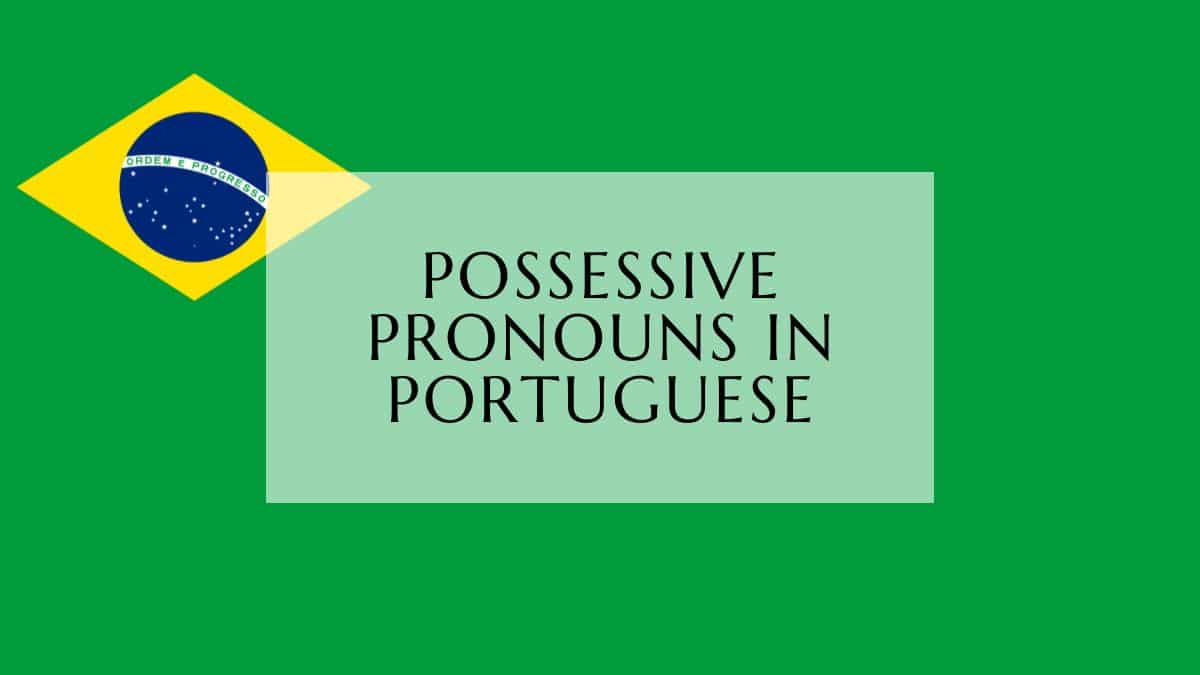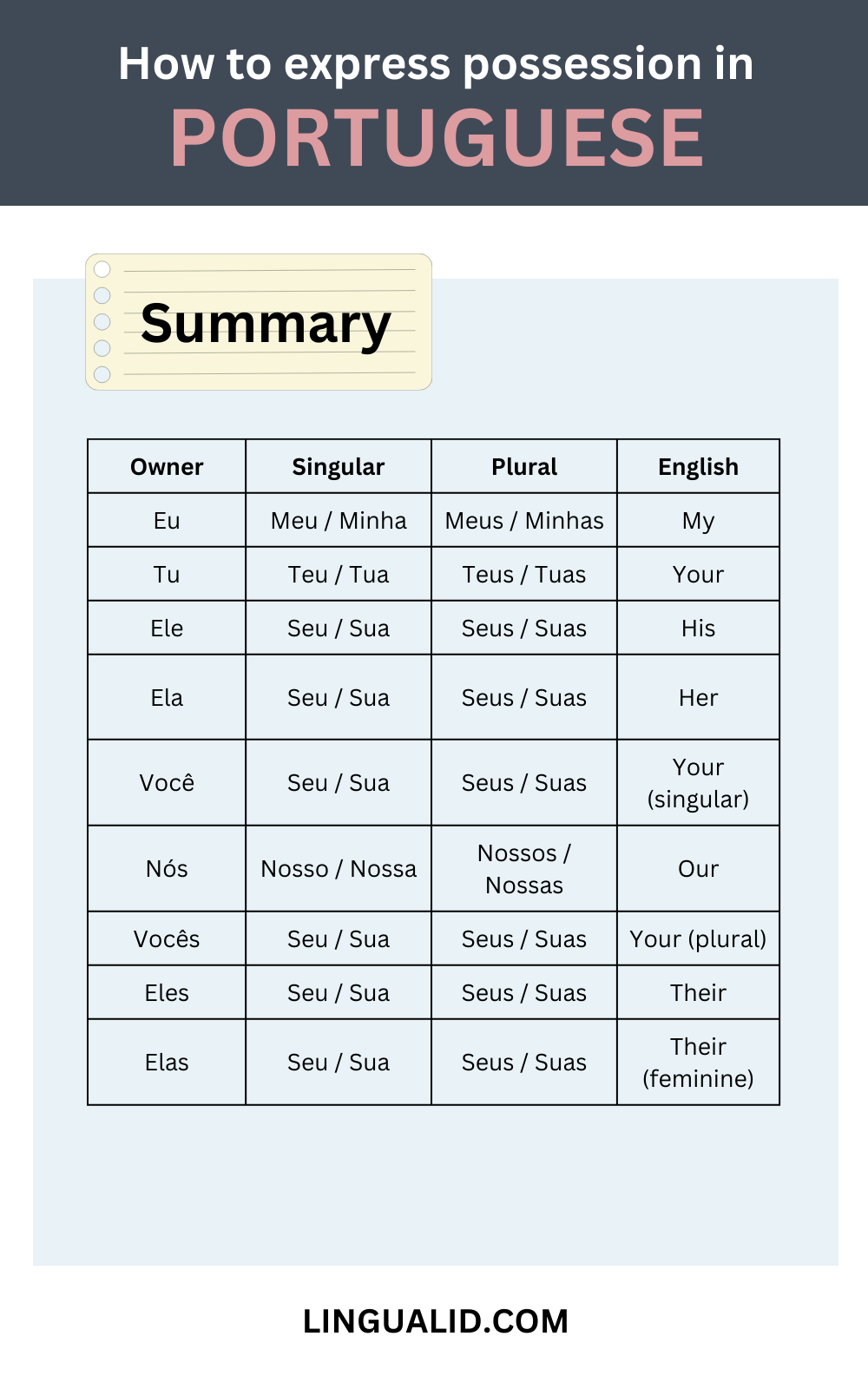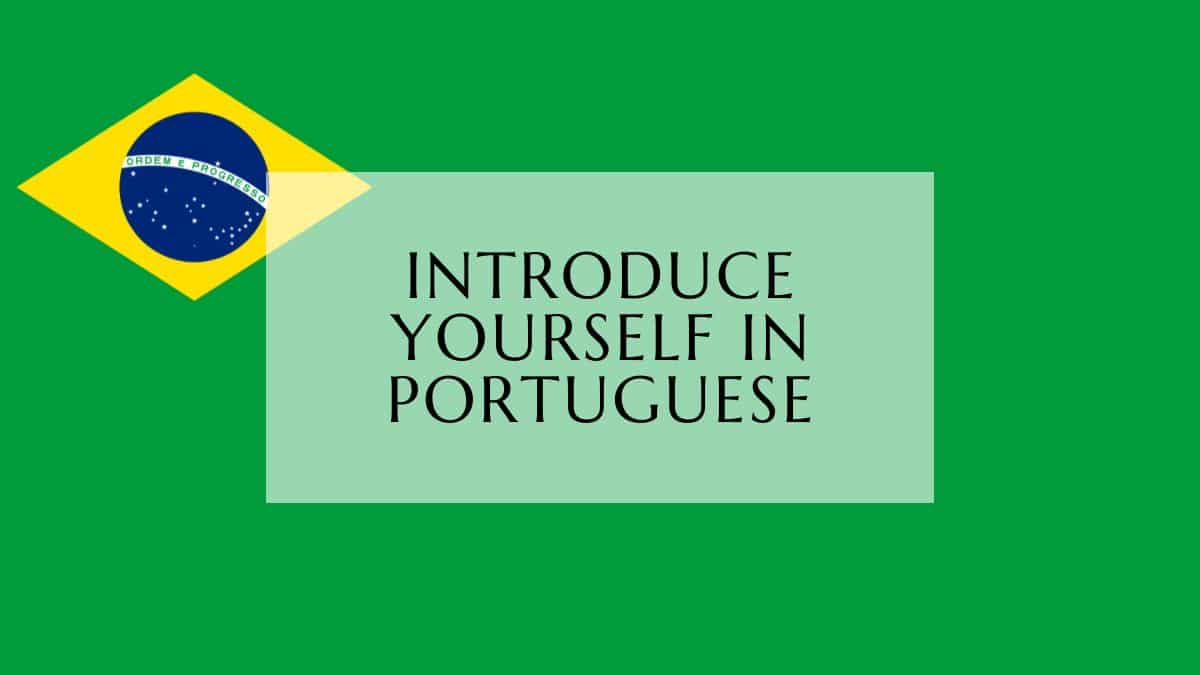In this lesson, we will talk about possessive pronouns in Portuguese, how to use them, and how to avoid some confusions while expressing them.

Possessive Pronouns In Portuguese
Possessive pronouns are used to identify a thing/ person (possessor) that owning another thing/person (possessed), it can be a little confusing (or challenging) as they both have a gender and a quantity, let’s look at this table, and then discuss how to make it less confusing:
| Personal Pronouns | Possessive Pronouns (Singular: Masc/Fem) | Possessive Pronouns (Plural: Masc/Fem) | English |
| Eu | Meu / Minha | Meus / Minhas | My |
| Tu | Teu / Tua | Teus / Tuas | Your |
| Ele | Seu / Sua | Seus / Suas | His |
| Ela | Seu / Sua | Seus / Suas | Her |
| Você | Seu / Sua | Seus / Suas | Your (singular) |
| Nós | Nosso / Nossa | Nossos / Nossas | Our |
| Vocês | Seu / Sua | Seus / Suas | Your (plural) |
| Eles | Seu / Sua | Seus / Suas | Their |
| Elas | Seu / Sua | Seus / Suas | Their (feminine) |
In this table, the pronouns changes according to the gender and quantity of the things/people being possessed:
For example:
Meu carro (my car)
Minha filha (my daughter)
Meus carros (my cars)
Minhas filhas (my daughters)
When you continue looking at the table, things get a bit confusing; try to translate this into English: Seu carro
Right! It’s your car, his car, her car
Note: you can practice what you’ve learned here, and learn how to pronounce each of the words in our Memrise course here, don’t know how to use the platform or sign up? we’ve got you covered in this easy-to-follow tutorial here.
How To Avoid Confusion
To clear things up, we use four different pronouns (dele, dela, deles, delas), take a look:
| Personal Pronouns | Possessive Pronouns (Singular: Masc/Fem) | Possessive Pronouns (Plural: Masc/Fem) | English |
| Eu | Meu / Minha | Meus / Minhas | My |
| Tu | Teu / Tua | Teus / Tuas | Your |
| Ele | Dele | Dele | His |
| Ela | Dela | Dela | Hers |
| Você | Seu / Sua | Seus / Suas | Your (singular) |
| Nós | Nosso / Nossa | Nossos / Nossas | Our |
| Vocês | Seu / Sua | Seus / Suas | Your (plural) |
| Eles | Deles | Deles | Their |
| Elas | Delas | Delas | Their (feminine) |
Note: These pronouns reflect the gender of the possessor:
O carro dele: his car
Os carros dele: his cars
A filha dele: his daughter
As filhas dele: his daughters

Mastering Portuguese Possessive Pronouns
Short Answer Quiz
Instructions: Answer the following questions in 2-3 sentences.
- What are possessive pronouns used for in Portuguese? Provide an example.
- What two grammatical factors determine the form of a possessive pronoun in Portuguese?
- Translate the following phrases to English: “Meu irmão,” “Suas primas.”
- Why might the pronoun “seu” cause confusion when translating from Portuguese to English?
- What four pronouns are used to clarify possession and avoid ambiguity with “seu”?
- How do the clarifying pronouns (“dele,” “dela,” “deles,” “delas”) change to reflect the possessor?
- Translate the following phrases to Portuguese: “Her house,” “Their (masculine) books.”
- What is the English translation of the phrase “O gato dela”?
- Provide an example of a Portuguese phrase using “nossos” and translate it to English.
Answer Key
- Possessive pronouns in Portuguese indicate ownership or possession of a noun. For example, “meu livro” means “my book.”
- The form of a Portuguese possessive pronoun changes based on the gender (masculine/feminine) and number (singular/plural) of the possessed noun.
- “Meu irmão” means “my brother,” and “suas primas” means “her cousins” or “your (plural) cousins.”
- “Seu” can be ambiguous as it translates to “your,” “his,” or “her,” potentially leading to confusion about the possessor.
- The pronouns “dele” (his), “dela” (hers), “deles” (their – masculine), and “delas” (their – feminine) clarify possession.
- These pronouns change their ending to agree with the gender and number of the possessor.
- “Her house” translates to “A casa dela,” and “Their (masculine) books” translates to “Os livros deles.”
- “O gato dela” translates to “her cat.”
- “Nossos amigos são importantes” means “Our friends are important.”
Happy learning!
Oualid Cheddadi is the founder of Lingualid, a platform that inspires independent language learners worldwide, regardless of the language they are learning. The name “Lingualid” is derived from the Portuguese word for “language,” “língua,” and the last three letters of Oualid’s name, “Lid.”



